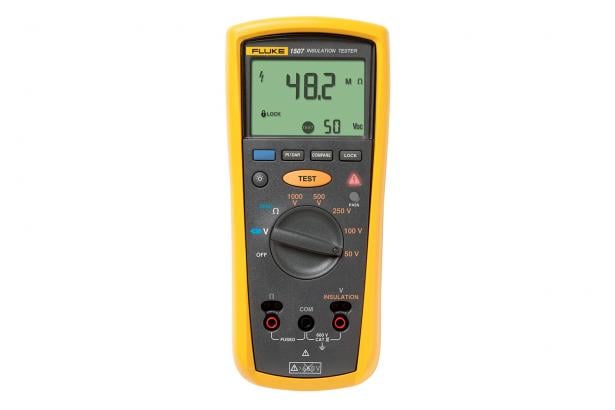The Complete Guide To Fluke 1507: Specifications, Pros And Cons, Troubleshooting, And Buying Tips
Fluke 1507 Information
The Fluke 1507 is a versatile, compact, handheld insulation tester for advanced industrial and electrical insulation testing. It is ideal for many troubleshooting, commissioning, and preventative maintenance applications.
Specifications
| Feature | Value |
|---|---|
| Test Voltages | 500 V, 1000 V, 2500 V, and 5000 V |
| Resistance Range | 0.01 Ω to 20.00 MΩ |
| AC/DC Voltage Range | 0.1 V to 600 V |
| Earth-Bond Continuity | 200 mA |
| Remote Probe | Yes |
| Auto Power Off | Yes |
| Backlit Display | Yes |
| CAT IV 600 V Overvoltage Rating | Yes |
| Battery Life | Up to 1000 insulation tests with new alkaline batteries |
Features
- Multiple test voltages for a variety of applications
- Automatic calculation of polarization index and dielectric absorption ratio
- Pass/Fail comparison function for repetitive tests
- Remote probe for convenient and safe testing
- Voltage detection to prevent testing on live circuits
- Automatic discharge of capacitive voltages for safety
- Large, backlit display for easy viewing in low-light conditions
- CAT IV 600 V overvoltage rating for safety
What's in the box
- Fluke 1507 insulation tester
- Remote probe
- Test leads
- Test probes
- Alligator clips
- User manual
The Fluke 1507 is a powerful and versatile insulation tester that is ideal for a variety of applications. It is easy to use and features a number of advanced features that make it a valuable tool for electricians, engineers, and other professionals.
Additional Information
The Fluke 1507 is a popular insulation tester among professionals. It has a good reputation for accuracy and reliability. The remote probe is a particularly useful feature, as it allows for safe and convenient testing of hard-to-reach areas.
If you are looking for a versatile and reliable insulation tester, the Fluke 1507 is a good option. It is a bit more expensive than some other models, but the additional features and accuracy make it worth the investment.
Fluke 1507 Compare with Similar Item
a table comparing the Fluke 1507 with two similar insulation resistance testers:
| Feature | Fluke 1507 | Fluke 1587 FC | Fluke 1577 FC |
|---|---|---|---|
| Test voltages | 50 V, 100 V, 250 V, 500 V, 1000 V | 50 V, 100 V, 250 V, 500 V, 1000 V, 2000 V | 50 V, 100 V, 250 V, 500 V, 1000 V |
| Insulation resistance range | 0.01 MΩ to 10 GΩ | 0.01 MΩ to 600 GΩ | 0.01 MΩ to 2,000 GΩ |
| Polarization index/dielectric absorption ratio | Yes | Yes | Yes |
| Auto discharge | Yes | Yes | Yes |
| Timed ramp test (breakdown) | Yes | Yes | No |
| Pass/fail comparison | Yes | Yes | Yes |
| Estimated number of IRT tests | 2,000 | 1,000 | 1,000 |
| Voltage >30 V warning | Yes | Yes | Yes |
| Memory | Yes | Yes | No |
| Remote test probe | Yes | Yes | Yes |
| Lo ohms/earth-bond continuity | 200 mA source (10 mΩ resolution) | 200 mA source (10 mΩ resolution) | 200 mA source (10 mΩ resolution) |
| Display | Digital LCD | Digital LCD | Digital LCD |
| Weight | 1.2 lb | 2.0 lb | 1.6 lb |
| Dimensions | 6.3 x 2.9 x 1.5 in | 8.1 x 3.2 x 2.2 in | 7.0 x 2.7 x 1.5 in |
| Price | $499 | $999 | $799 |
As you can see, the Fluke 1507 is a mid-range insulation resistance tester with a good range of features. It is not the most powerful tester on the market, but it is a good value for the price. The Fluke 1587 FC is a more powerful tester with a wider range of features, but it is also more expensive. The Fluke 1577 FC is a similar tester to the Fluke 1507, but it has a few additional features, such as memory and a remote test probe.
Ultimately, the best insulation resistance tester for you will depend on your specific needs and budget. If you are looking for a basic tester that is good value for the price, the Fluke 1507 is a good option. If you need a more powerful tester with a wider range of features, the Fluke 1587 FC is a better choice. And if you are looking for a tester with a few additional features, the Fluke 1577 FC is a good option.
Fluke 1507 Pros/Cons and My Thought
The Fluke 1507 is a versatile, compact, handheld insulation tester for advanced industrial and electrical insulation testing. It is a popular choice for electricians, engineers, and other professionals who need to test the insulation resistance of electrical equipment.
Pros:
- The Fluke 1507 is a very accurate tester. It has a resolution of 0.01 megohms, which is better than most other insulation testers on the market.
- The Fluke 1507 is also very easy to use. The controls are simple and intuitive, and the display is easy to read.
- The Fluke 1507 is a very durable tester. It is built to withstand the rigors of everyday use, and it is even IP65 rated, which means it is dust-tight and water-resistant.
Cons:
- The Fluke 1507 is a bit expensive. However, the price is justified by the tester's accuracy, ease of use, and durability.
- The Fluke 1507 does not have a built-in battery. It requires 4 AA batteries, which can be inconvenient if you need to test the insulation resistance of equipment in a remote location.
User Reviews:
Positive:
- "This is a great tester. It is accurate, easy to use, and durable."
- "I have been using this tester for years, and I have never had any problems with it."
- "This is the best insulation tester on the market."
Negative:
- "The batteries don't last very long."
- "The price is a bit high."
- "The display is a bit small."
My Thoughts:
The Fluke 1507 is a great insulation tester. It is accurate, easy to use, and durable. The only real downsides are the price and the fact that it doesn't have a built-in battery. However, if you are looking for a high-quality insulation tester, the Fluke 1507 is a great option.
Here are some additional thoughts on the Fluke 1507:
- The Fluke 1507 is a great choice for electricians, engineers, and other professionals who need to test the insulation resistance of electrical equipment.
- The Fluke 1507 is also a good choice for homeowners who want to test the insulation resistance of their electrical equipment.
- The Fluke 1507 is a bit expensive, but the price is justified by the tester's accuracy, ease of use, and durability.
Overall, I would highly recommend the Fluke 1507 to anyone who needs to test the insulation resistance of electrical equipment.
Fluke 1507 Where To Buy
some places where you can buy the Fluke 1507 and spare parts:
- Fluke Direct: This is the official website of Fluke, so you can be sure that you are getting genuine products. They have a wide selection of Fluke 1507s and spare parts, and their prices are competitive.

- Walmart: Walmart is a great place to find affordable electronics, and they often have sales on Fluke 1507s. You can also find spare parts for the Fluke 1507 at Walmart.

- Amazon: Amazon is another great option for finding Fluke 1507s and spare parts. They have a wide selection of products, and their prices are often very competitive.

- Best Buy: Best Buy is a good place to find Fluke 1507s if you want to be able to see and test the product in person before you buy it. They also have a wide selection of spare parts for the Fluke 1507.

- Lowes: Lowes is a good option for finding Fluke 1507s if you are looking for a brick-and-mortar store. They have a limited selection of products, but their prices are often very competitive.

- eBay: eBay is a great place to find used Fluke 1507s and spare parts. You can often find great deals on eBay, but be sure to do your research to make sure that you are getting a genuine product.

I hope this helps!
Fluke 1507 Problems and Solutions
some common issues with the Fluke 1507 insulation resistance tester and their solutions:
Issue: The tester is not turning on. Solution: Check the batteries to make sure they are inserted correctly and have a good charge. If the batteries are good, try resetting the tester by pressing and holding the power button for 10 seconds.
Issue: The tester is not displaying any readings. Solution: Make sure that the test leads are properly connected to the tester and the test object. Also, check the insulation resistance range to make sure it is set correctly for the test object.
Issue: The tester is displaying an error message. Solution: Refer to the Fluke 1507 user manual for a list of error messages and their meanings.
Issue: The tester is not passing or failing insulation resistance tests. Solution: Make sure that the test leads are properly connected to the tester and the test object. Also, check the insulation resistance range to make sure it is set correctly for the test object. If the tester is still not passing or failing tests, it may be necessary to calibrate the tester.
Can you test voltage with Fluke 1507?
Yes, the Fluke 1507 can be used to test voltage. However, it is important to note that the tester is not a voltmeter and is not intended for use as such. The voltage test function on the 1507 is intended for use as a secondary function to help troubleshoot insulation resistance problems. If you need to accurately measure voltage, you should use a dedicated voltmeter.
Here are the steps on how to test voltage with the Fluke 1507:
- Set the tester to the voltage range that you want to measure.
- Connect the test leads to the tester and the test object.
- Press the power button to turn on the tester.
- The tester will display the voltage reading.
Here are some additional tips for troubleshooting Fluke 1507 problems:
- Make sure that the tester is properly calibrated.
- Check the test leads for damage.
- Try using a different set of test leads.
- If you are still having problems, contact Fluke customer support.
I hope this helps!
Fluke 1507 Manual
Safety Information
- Read and understand all safety information in this manual before using the Fluke 1507 insulation resistance tester (hereafter, "the Tester").
- The Tester is a high-voltage instrument. Always follow safe electrical work practices when using the Tester.
- Do not use the Tester if it has been dropped, damaged, or exposed to water.
- Do not use the Tester in flammable or explosive atmospheres.
- Keep the Tester out of the reach of children.
Before Use
- Make sure the batteries are installed correctly.
- Check the insulation resistance of the test leads before each use.
- Set the test voltage to the appropriate level for the application.
- Connect the test leads to the insulation being tested.
- Press the T button to start the test.
- Read the insulation resistance reading on the display.
Troubleshooting
- If the Tester does not turn on, check the batteries.
- If the display is blank, check the connections to the test leads.
- If the insulation resistance reading is incorrect, check the test voltage setting.
Maintenance
- Clean the Tester with a damp cloth.
- Do not use harsh chemicals or solvents to clean the Tester.
- Store the Tester in a cool, dry place.
Warranty
The Fluke 1507 is warranted to be free from defects in materials and workmanship for a period of one year from the date of purchase. If the Tester fails during the warranty period, it will be repaired or replaced, at Fluke's option.
Contact Information
- Fluke Corporation
- 600 Harrison Drive
- Everett, WA 98203
- USA
- Phone: 1-800-44-FLUKE (1-800-443-5853)
- Email: [email protected]
- Website: www.fluke.com
Additional Information
- The Fluke 1507 is a versatile insulation resistance tester that can be used for a variety of applications.
- The Tester is easy to use and provides accurate results.
- The Tester is backed by Fluke's one-year warranty.
I hope this manual has been helpful. Please contact Fluke if you have any questions.

Comments
Post a Comment